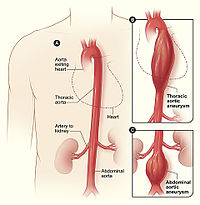
Photo from wikipedia
BACKGROUND Advances in endovascular aneurysm repair now allow surgeons to treat high-risk patients with complex aortic aneurysms. Stringent selection criteria for repair exist from an anatomic and technical perspective; however,… Click to show full abstract
BACKGROUND Advances in endovascular aneurysm repair now allow surgeons to treat high-risk patients with complex aortic aneurysms. Stringent selection criteria for repair exist from an anatomic and technical perspective; however, there is a paucity of literature examining frailty in patients being evaluated for fenestrated and branched endovascular aortic repair (FEVAR). As a marker of frailty well supported in the literature, we hypothesized that preoperative hypoalbuminemia would increase risk for short-term mortality after endovascular juxtarenal and thoracoabdominal aortic aneurysm repair. METHODS One thousand eighty nine consecutive patients with juxtarenal and thoracoabdominal aortic aneurysms considered high risk for open surgery from a single institution who underwent FEVAR from 2001 to 2014 were included in the study. Risk factors for all-cause mortality were identified via a Cox regression model on time to death. RESULTS The patients with severe hypoalbuminemia (albumin <2.4 g/dL) had significantly increased 30-day mortality (P = 0.025, odds ratio [OR]: 4.967 (95% CI: 1.385-17.814, normal versus severe) and 2-year mortality P = 0.006, OR: 2.4, 95% CI: 1.05-5.73, normal versus severe), as well as increased 30-day complication rates P = 0.026, OR: 1.91, 95% CI: 0.9-4.17, normal versus severe). A univariate analysis for 30-day mortality revealed no significant difference in median age: 75.1 vs. 72.5 years (alive at 30 days (Q1, Q3: 69.8, 80.1) versus expired (Q1, Q3: 69.3, 77.8), P = 0.24. CONCLUSIONS Patients with hypoalbuminemia have significantly increased mortality risk. Albumin level is regulated by nutritional intake and inflammation due to chronic disease, which make it a useful part of a preoperative frailty assessment. Further studies are needed to identify whether optimizing nutrition status will affect albumin levels or decrease mortality.
Journal Title: Annals of vascular surgery
Year Published: 2017
Link to full text (if available)
Share on Social Media: Sign Up to like & get
recommendations!